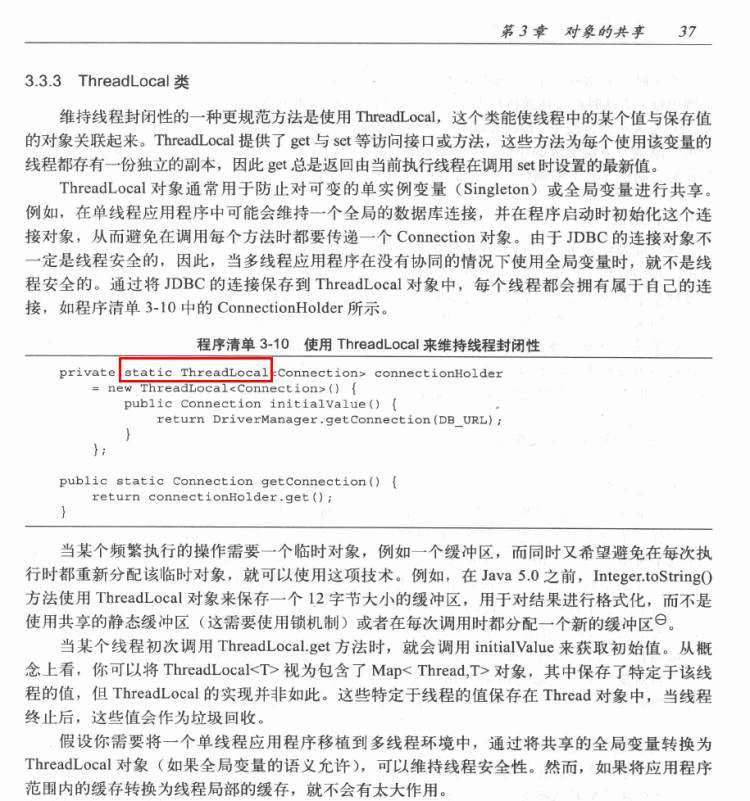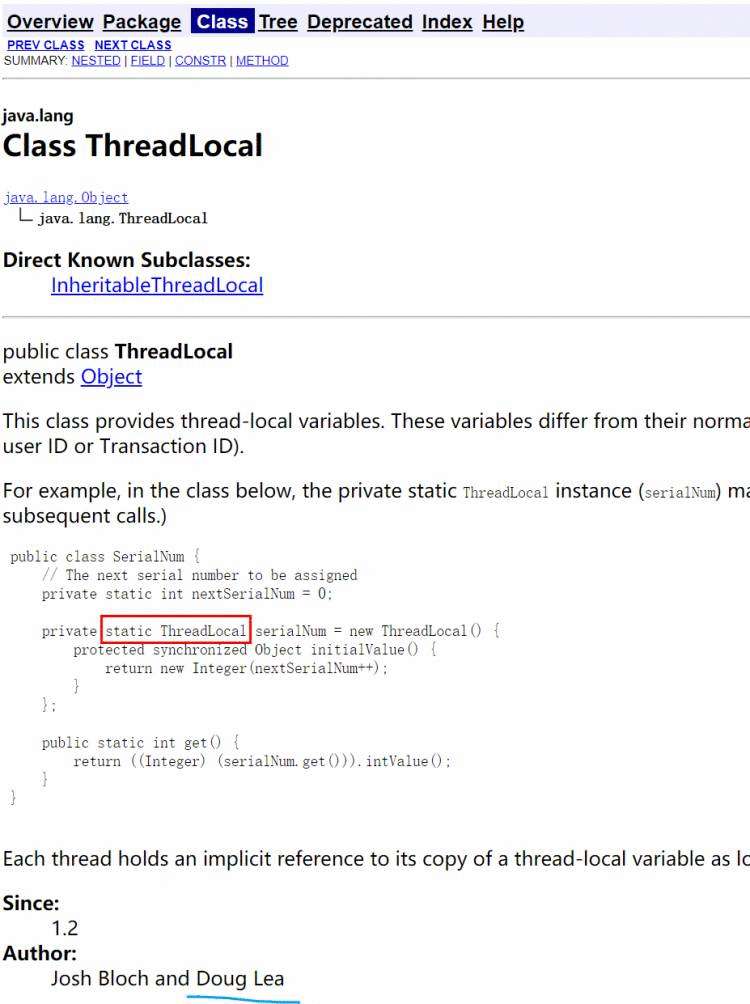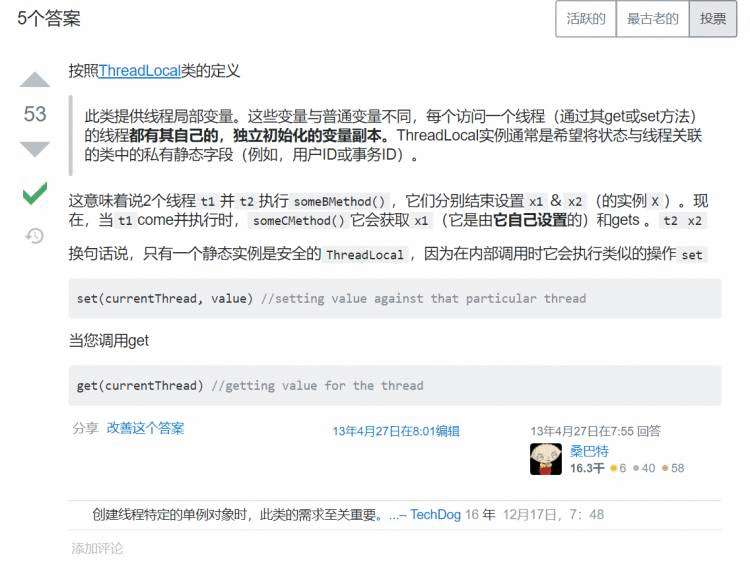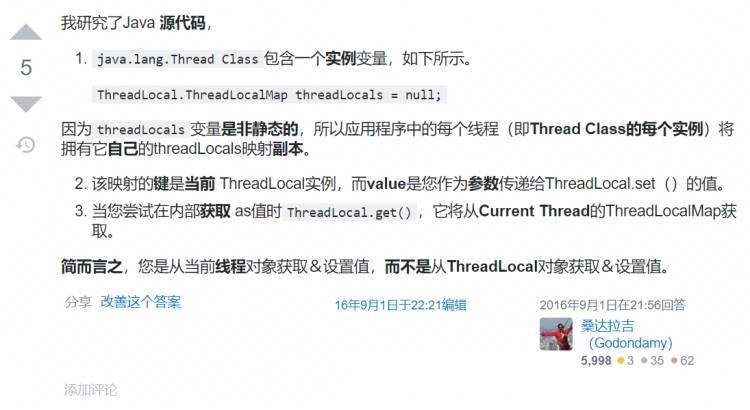作者:农民工小耿 | 来源:互联网 | 2023-09-24 17:05
ThreadLocal是线程私有变量,本身是解决多线程环境线程安全,可以说单线程实际上没必要使用。
既然多线程环境本身不使用static,那么又怎么会线程不安全。所以这个问题本身并不是问题,只是有人没有理解ThreadLocal的真正使用场景,所以有此疑问。
看看jdk源码推荐ThreadLocal使用static吧:
/*** This class provides thread-local variables. These variables differ from* their normal counterparts in that each thread that accesses one (via its* {@code get} or {@code set} method) has its own, independently initialized* copy of the variable. {@code ThreadLocal} instances are typically private* static fields in classes that wish to associate state with a thread (e.g.,* a user ID or Transaction ID).** For example, the class below generates unique identifiers local to each* thread.* A thread's id is assigned the first time it invokes {@code ThreadId.get()}* and remains unchanged on subsequent calls.*
* import java.util.concurrent.atomic.AtomicInteger;** public class ThreadId {* // Atomic integer containing the next thread ID to be assigned* private static final AtomicInteger nextId = new AtomicInteger(0);** // Thread local variable containing each thread's ID* private static final ThreadLocal threadId =* new ThreadLocal() {* @Override protected Integer initialValue() {* return nextId.getAndIncrement();* }* };** // Returns the current thread's unique ID, assigning it if necessary* public static int get() {* return threadId.get();* }* }* * Each thread holds an implicit reference to its copy of a thread-local* variable as long as the thread is alive and the {@code ThreadLocal}* instance is accessible; after a thread goes away, all of its copies of* thread-local instances are subject to garbage collection (unless other* references to these copies exist).** @author Josh Bloch and Doug Lea* @since 1.2*/
public class ThreadLocal {/*** ThreadLocals rely on per-thread linear-probe hash maps attached* to each thread (Thread.threadLocals and* inheritableThreadLocals). The ThreadLocal objects act as keys,* searched via threadLocalHashCode. This is a custom hash code* (useful only within ThreadLocalMaps) that eliminates collisions* in the common case where consecutively constructed ThreadLocals* are used by the same threads, while remaining well-behaved in* less common cases.*/
这个是Josh Bloch和Doug Lea写的,再看看他们的著作:《Java并发编程实战》

再看看jdk中的官方文档:

已经说的很明白了,再看看其他答案吧:

按照ThreadLocal类的定义
此类提供线程局部变量。这些变量与普通变量不同,每个访问一个线程(通过其get或set方法)的线程都有其自己的,独立初始化的变量副本。ThreadLocal实例通常是希望将状态与线程关联的类中的私有静态字段(例如,用户ID或事务ID)。
这意味着说2个线程t1并t2执行someBMethod(),它们分别结束设置x1&x2(的实例X)。现在,当t1come并执行时,someCMethod()它会获取x1(它是由它自己设置的)和gets 。t2x2
换句话说,只有一个静态实例是安全的ThreadLocal,因为在内部调用时它会执行类似的操作set

Java 源代码,
-
java.lang.Thread Class包含一个实例变量,如下所示。
ThreadLocal.ThreadLocalMap threadLocals = null;
因为threadLocals变量是非静态的,所以应用程序中的每个线程(即Thread Class的每个实例)将拥有它自己的threadLocals映射副本。
-
该映射的键是当前 ThreadLocal实例,而value是您作为参数传递给ThreadLocal.set()的值。
-
当您尝试在内部获取 as值时ThreadLocal.get(),它将从Current Thread的ThreadLocalMap获取。
简而言之,您是从当前线程对象获取&设置值,而不是从ThreadLocal对象获取&设置值。